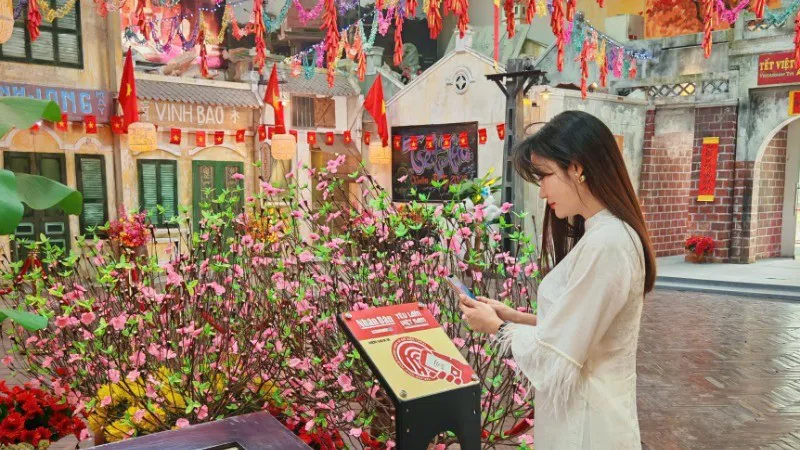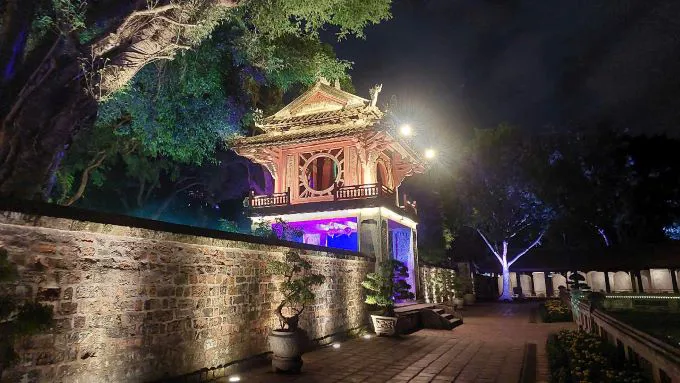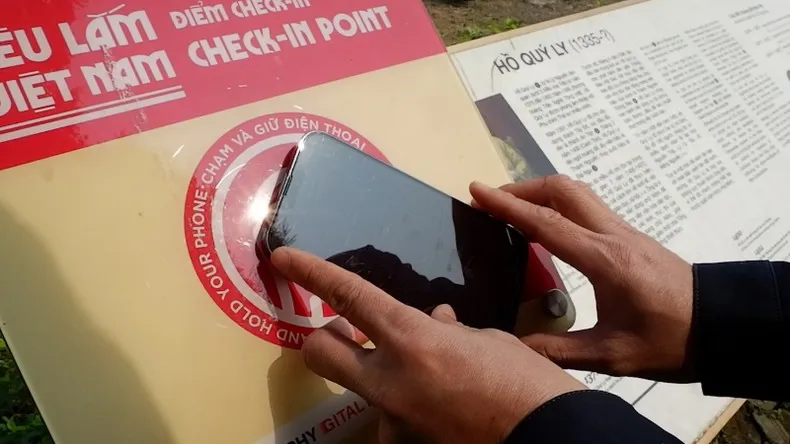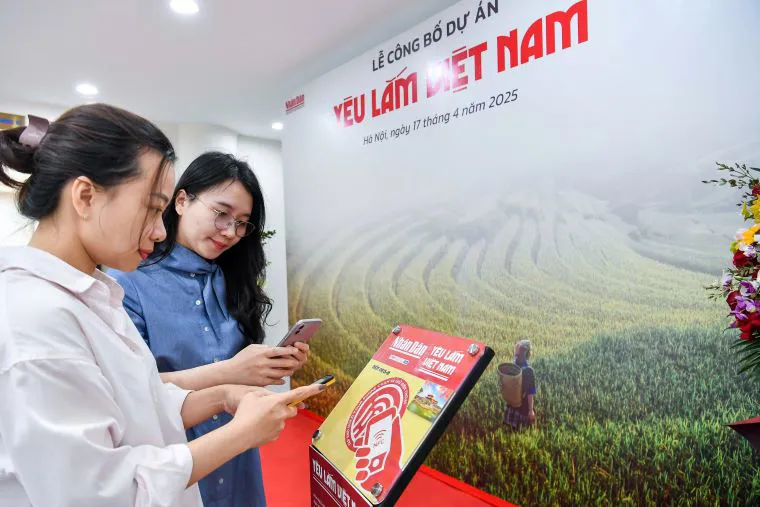Hanoi's typical heritage promoted through digitalized services
Three prominent relics of Hanoi are available for digital tourism, in which tourists can scan NFC codes to learn more about the destination.
THE HANOI TIMES — As the country prepares to mark the 50th anniversary of the Liberation of the South and National Reunification (April 30, 1975–2025), the Thăng Long Imperial Citadel, a UNESCO World Heritage Site, is witnessing a surge in visitors.
More than a historic site, the citadel is often seen as a place that "soothes the soul of a thousand-year-old nation", and once the headquarters of the resistance war against the United States.
Many structures have been destroyed over time, but the above and underground relics here prove the existence of a political, economic, and cultural center of the country. The architectural ruins and archaeological artifacts from many dynasties in history piled on top of each other showed the uniqueness of architecture and fine arts.
With a touch of the phone, the history of the UNESCO-recognized Thang Long Imperial Citadel opened before the eyes of visitors.
"My phone, when I tap my phone on the Near Field Communication (NFC) chip embedded board, will display all the important information about the relic site, as well as information about the number of visits to this place, and you can share moments, save impressions about the day, month and year you came here. This makes me feel very interested," said Dang Hong Van, a tourist from Danang, while touring the Thang Long Imperial Citadel.

A visitor scans an NFC code at the Thang Long Imperial Citadel. Photo: Thanh Dat/The Hanoi Times
From September 1968 until the historic victory on April 30, 1975, the Thăng Long Imperial Citadel served as a command center, where the Politburo, the Central Military Commission, and the General Command convened numerous high-level meetings, including those that shaped key military strategies in the fight against American forces.
According to Nguyen Thanh Quang, Director of the Thang Long-Hanoi Heritage Conservation Center, with a few days to go before the 50th anniversary of the liberation of the South and national reunification, it is time for generations of Vietnamese people to come to the place to learn about the headquarters of the Vietnamese People's Army during the years of resistance against the US.
"In recent years, the center has focused on digitization to preserve and promote the value of heritage. Typically, we have launched the mobile app of Thang Long Imperial Citadel, restored heritage in digital space, applied electronic ticketing technology, and organized online exhibitions," said Quang.
Also on this occasion, Thang Long-Hanoi Heritage Conservation Center coordinated with Nhan Dan Newspaper to install an NFC chip-embedded board right at the exhibition, near the ticket sales area, making it easily accessible to tourists.

The Temple of Literature sparks at night. Photo: Ngo Minh/The Hanoi Times
Besides the Thang Long Imperial Citadel, the Hanoi People's Committee has selected two other prominent relics to install NFC chip-enabled boards: the Temple of Literature in Dong Da District and Hoa Lo Prison in Hoan Kiem District.
Using technology to explore destinations
The three above-mentioned destinations are highlighted in the "Vietnam is so loving" project to promote historical and cultural sites across the country, creating unique experiences for tourists.
The project, led by Nhan Dan Newspaper and its partner Phygital Labs, consists of the free installation of nearly 200 NFC chip-embedded boards at famous landmarks across the country.

A board embedded with an NFC chip at the Ho Dynasty Citadel in Thanh Hoa Province. Photo: Thanh Dat/The Hanoi Times
From the Lung Cu Flagpole to the Ca Mau Cape, with a tap of their phone on an NFC terminal, visitors can open a digital space with many integrated features. From checking in with the help of AI guides to explore information and history about the location, to building a personalized itinerary, or completing it to earn gifts and bonus points.
The project's website www.yeulamvietnam.vn is designed with a modern, easy-to-use interface and is bilingual in Vietnamese and English, making it easy for visitors to access official information about the destination.
In addition, the interactive online map helps visitors find outstanding cultural destinations, track their experiences, and connect deeply with each place. In the future, the platform will build indigenous cultural data to promote local sustainable tourism and the digital economy.
After more than four months of implementation, tens of thousands of photos have been taken and shared by tourists on NFC chip-mounted panels across the country.
Introducing the project on April 17, Le Quoc Minh, Editor-in-Chief of Nhan Dan Newspaper, said the project is part of a larger vision to turn media platforms and digital data into a means to connect people with cultural and tourism values.

Young people tap their phones on an NFC terminal. Photo: Thanh Dat/The Hanoi Times
"Vietnam is so loving" is not only an experiential journey, but also a tool for educating digital citizens, encouraging young people to understand and carry on traditional values with a technological mindset.
According to Huy Nguyen, General Director of Phygital Labs, the “Vietnam is so loving” project is the answer to the growing need for personalized travel experiences, between real and digital spaces.
"Applying technology to cultural heritage will help preserve traditional values and enrich Vietnam's image among international friends, while creating new opportunities for the tourism industry and creative cultural fields," said Huy Nguyen.
The "Vietnam is so loving" project opens a community to explore digital tourism, where each person can become a "tourism ambassador" through activities such as accumulating points that can be redeemed for attractive gifts from the program; sharing photos and clips of experiences on social networks with the hashtag #YeuLamVietNam; inviting international friends to join the journey to explore Vietnam through technology, among others.












